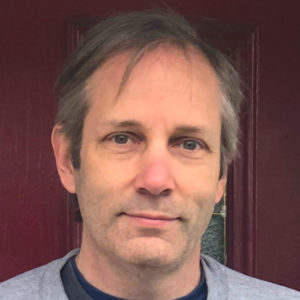 Tom Murphy is a professor emeritus of the departments of Physics and Astronomy & Astrophysics at the University of California, San Diego. An amateur astronomer in high school, physics major at Georgia Tech, and PhD student in physics at Caltech, Murphy spent decades reveling in the study of astrophysics. For most of his 20 year career as a professor, he led a project to test General Relativity by bouncing laser pulses off of the reflectors left on the Moon by the Apollo astronauts, achieving one-millimeter range precision. He is also co-inventor of an aircraft detector used by the world’s largest telescopes to avoid accidental illumination of aircraft by laser beams.
Tom Murphy is a professor emeritus of the departments of Physics and Astronomy & Astrophysics at the University of California, San Diego. An amateur astronomer in high school, physics major at Georgia Tech, and PhD student in physics at Caltech, Murphy spent decades reveling in the study of astrophysics. For most of his 20 year career as a professor, he led a project to test General Relativity by bouncing laser pulses off of the reflectors left on the Moon by the Apollo astronauts, achieving one-millimeter range precision. He is also co-inventor of an aircraft detector used by the world’s largest telescopes to avoid accidental illumination of aircraft by laser beams.
Murphy’s keen interest in energy topics began with his teaching a course on energy and the environment for non-science majors at UCSD. Motivated by the unprecedented challenges we face, he applied his instrumentation skills to exploring alternative energy and associated measurement schemes. Following his natural instincts to educate, Murphy is eager to get people thinking about the quantitatively convincing case that our pursuit of an ever-bigger scale of life faces gigantic challenges and carries significant risks.
Both Murphy and the Do the Math blog changed a lot after about 2018. Reflections on this change can be found in Confessions of a Disillusioned Scientist.
Note from Tom: To learn more about my personal perspective and whether you should dismiss some of my views as alarmist, read my Chicken Little page.
Views: 29813

What fun: in 2500 years, we consume our home galaxy’s radiant energy output.
Will you look backward as well, just to fill out the historical curve? History has seen several energy crises, esp. when considering that most necessary energy source, food. Hunting/gathering in kcal gave way to agriculture and a 10x population increase. Later muscle and wind gave way to steam, powered by wood. Wood was exhausted early in the Industrial Revolution, so England transitioned to coal. Petroleum mining saved the whales. And so on.
Thank you; I look forward to your next post.
Yes, it would certainly be interesting to look back at previous pinch points to understand what they looked like and what coping lessons we might glean (or is it just: find a new source, NOW!).
You’re going to write a book on this topic of basic physical limits, right? Please? I would use it for teaching all the time!!!!